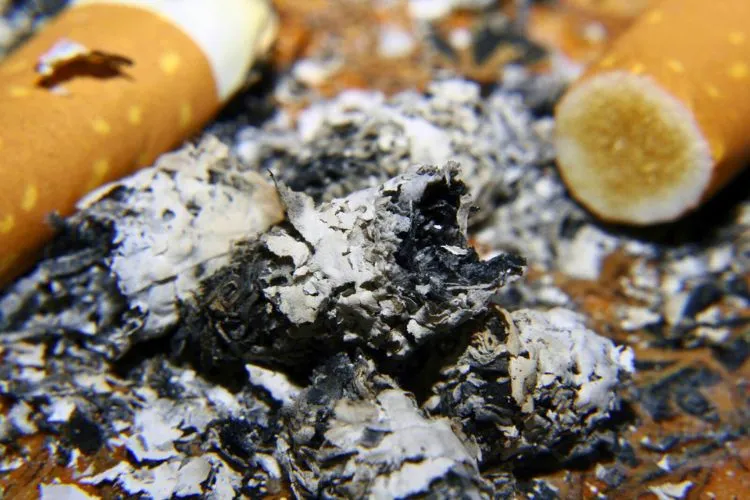In the world of gardening, we’re always searching for sustainable and cost-effective ways to nourish our plants.
One surprising contender is cigarette ash, touted by some to contain beneficial nutrients. But does this unconventional amendment indeed have a place in horticulture?
I mean, are cigarette ashes good for plants for real?
This article explores this question, and tries to find a definitive answer. In fact, we’ll delve into the science behind cigarette ash composition and its potential effects on plant health and growth.

Are Cigarette Ashes Good for Plants?
No, cigarette ashes are not good for plants. While they contain small amounts of potassium, phosphorus, and trace elements necessary for plant growth, they also contain harmful substances like heavy metals and toxic alkaloids.
The disadvantages outweigh the benefits, causing more harm than good to plants.
When cigarette ashes are added to the soil, they can significantly affect the soil’s pH level, which can, in turn, impair plant health and growth.
In addition to these negative effects, sustained use of cigarette ashes in plant care can lead to a build-up of harmful chemicals in the soil, increasing the risk of plant stress or even death.
Furthermore, contaminants may find their way into the food chain, posing a potential threat to humans and animals who consume these plants or their by-products.
Safer alternatives for providing essential nutrients to plants, such as compost and organic fertilizers, should be utilized to avoid the detrimental impact of cigarette ash on our gardens and the environment.
Are cigarette ashes good for plants indoors?
Cigarette ashes are not beneficial for indoor plants. They contain negligible amounts of beneficial minerals like potassium and calcium, but these are outweighed by the presence of harmful substances like nicotine, heavy metals, and soot.
These substances can be poison for indoor plants, leading to impaired growth and potential plant stress.

Although cigarette ashes can alter the pH of the soil to an extent, which some plants might favor, the overall potential harm from the toxic ingredients makes cigarette ashes an unsuitable soil amendment for indoor plants.
Safer alternatives such as compost or organic fertilizers are recommended instead.
Is cigarette ash good for grass?
Cigarette ash is not beneficial for grass. While it contains small amounts of potassium, nitrogen, phosphorus, and magnesium, which are essential nutrients for plants, it also contains harmful substances like heavy metals and alkaloids from nicotine.
These harmful substances can poison the grass and damage its overall health.

What’s more, the alkaline nature of cigarette ash can significantly alter the pH of the soil, potentially disrupting the balance of nutrients necessary for healthy grass growth. This imbalance can lead to a slowdown in grass growth and can make the grass more susceptible to diseases.
It’s also important to note that while some ashes, like those from wood, can be beneficial to grass due to their nutrient content, this is not the case for cigarette ash.
Serious concerns also extend to environmental implications. Besides the negative impacts on plant health, the use of cigarette ash in soil contributes to broader soil degradation and greenhouse gas emission issues.
Given these challenges, it’s clear that cigarette ash is not a good choice for nourishing grass or any other plants.
Instead of using cigarette ash, consider more healthy and sustainable soil amendments. Organic compost and fertilizers, for instance, can provide grass with necessary nutrients without the drawbacks associated with cigarette ash.
What does cigarette ash do to soil?
Cigarette ash can significantly impact soil in a few ways:
- Alteration of Soil pH: Cigarette ash is alkaline, and when it is added to the soil, it can increase the soil’s pH level, turning it more basic. This change can disrupt the pH balance that specific plants need to absorb nutrients effectively.
- Introduction of Harmful Substances: Cigarette ash contains heavy metals like cadmium, arsenic, and lead, as well as toxic alkaloids from nicotine. These substances can accumulate in the soil, damaging plant health and potentially entering the food chain if crops are grown in the contaminated soil.
- Influx of Minimal Beneficial Nutrients: Cigarette ash does have small amounts of potassium and other minor nutrients. However, these elements are usually present in such negligible amounts compared to commercial compost or fertilizers that they do not significantly contribute to plant nutrition.
- Blockage of Soil Pores: Cigarette ash is very fine and when wet can become clay-like, blocking soil pores and impeding drainage. This could potentially lead to waterlogging and root rot.
Given its harmful impacts, the use of cigarette ash as a soil amendment is not recommended.
Are cigarette ashes good for anything?
Cigarette ashes may have a few potential uses, although their involvement in these applications is not widely established.

- Cleaning Agent for Metals: A somewhat surprising use of cigarette ashes is as a cleaning agent, particularly for metals such as pewter. The ashes, when mixed with a damp cloth, can help restore shine to a dull metal surface.
- Possible Pesticide Properties: Some suggest using cigarette ash as a pesticide, due to the toxicity of nicotine to certain pests. However, this is not a widely recommended practice due to the harmful substances in cigarette ash that could pose risks to the plants themselves and the surrounding environment.
- Potential Use in Water Treatment: There has been some research exploring the use of cigarette ash in water treatment, particularly as a low-cost solution for removing arsenic from water.
Overall, it’s important to exercise caution when using cigarette ashes for any purpose, given the harmful substances they contain. It’s also vital to remember that these potential uses are not widely established or endorsed.
Conclusion:
In conclusion, while cigarette ashes contain trace amounts of beneficial nutrients, their harmful contents, such as heavy metals and nicotine, outweigh any potential benefits.
Using cigarette ash as a soil amendment can poison plants, disrupt soil pH balance, and lead to environmental issues.
Therefore, it is not wise to use cigarette ashes for plant care. Instead, safer alternatives like organic compost and fertilizers should be employed to maintain healthy and thriving plants.


